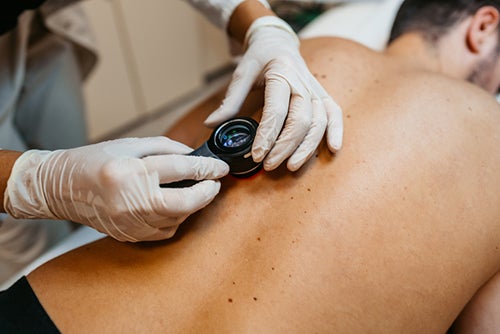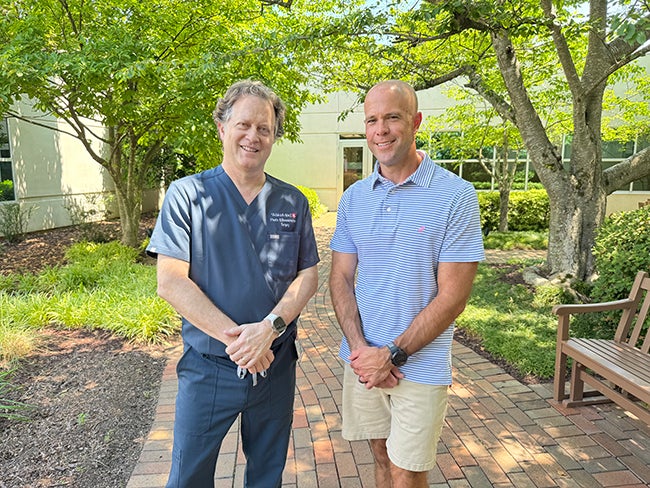Why is Skin Cancer More Common in Men? We Asked the Expert, Dr. Scott Hultman
June 11, 2024
By: WakeMed Health & Hospitals
Categories: Primary Care
Medically reviewed by Scott Hultman, MD, MBA, FACS
According to the World Health Organization's International Agency for Research on Cancer, "Skin cancers are the most common groups of cancers diagnosed worldwide, with more than 1.5 million new cases estimated in 2022."
Men are more likely to contract skin cancer than women, and men are more likely to die of melanoma of the skin than women. This Men's Health Month, we wanted to take time to highlight skin cancer facts, so we sat down with the chair of WakeMed Plastic & Reconstructive Surgery, Scott Hultman, MD, MBA, FACS, to learn how men, in particular, and all people, in general, can better recognize and protect themselves from skin cancer.
What is skin cancer and how does it occur?
Skin cancer occurs when the tissues mutate and begin to divide and grow beyond their function. It will typically spread to the lymph nodes and sometimes even further. The great thing about skin is that it's an external organ, so it can be observed and monitored. This gives us a head start on the biologic process of skin cancer evolution.
What are the risk factors for skin cancer?
There are several risk factors for contracting skin cancer. These include the following:
Ultraviolet light
It is emitted by the sun and is a type of electromagnetic radiation. These high-frequency waves can damage living tissue, especially on the surface of the skin. They are responsible for premature aging and many skin cancers. Over the years, all people accumulate skin damage from the sun.
Radiation exposure
Not only does the sun emit radiant light, but tanning beds and medical imaging also include some radiation. Intense exposure can damage the skin cells, so they're not functioning as well, and they don't produce the same type of collagen. They lose some of their thickness and plasticity, but more importantly, they can divide and turn into cancer cells.
Specifically, regarding medical imaging, breast cancer patients who had radiation are at heightened risk for contracting skin cancer years later. These are more unusual types of skin cancers, and these cancers can be particularly devastating. They spread quickly. They grow fast. Patients with a history of radiation will always need to watch for the development of skin cancer.
Also, a lot of burn patients who receive burn reconstruction are more likely to develop skin cancer. The pigment cells in skin, the melanocytes, stop working or they're not as dense after a burn, so there is more ultraviolet exposure. Furthermore, burn patients who have skin grafts have skin that functions well but does not have the same immunologic properties as native skin since surgeons are not transferring the entirety of the skin to the new area. Those grafts can breakdown causing chronic inflammation, leading to a greater risk for skin cancer.
Genetics
It is a well-known fact that people with a lighter complexion are at higher risk to ultraviolet radiation exposure. That doesn't mean people with darker skin are completely protected. It's important for all people to wear sunblock. In fact, it's common for people with darker skin types to contract skin cancers and have a delay in diagnosis because providers aren't expecting those patients to get skin cancer, and it is harder to see the cancers on darker skin.
Additionally, genetic abnormalities, such as psoriasis, where the skin breaks down more quickly, put a person at greater risk for skin cancer.
Chemicals
Environmental exposures can increase the risk for skin cancers. For example, arsenic, a naturally occurring element in well water in certain regions, is also employed in the production of specific pesticides and various other industries. Workers exposed to this element are more likely to contract skin cancers.
Additionally, employees exposed to paraffin, some petroleum products and coal tar are at a heightened risk.
Immunosuppressed individuals
It's also well established that those patients are at high risk for skin cancers if they are immunosuppressed. The concern is not only the skin cancer, but it also functions differently and is more virulent. So, a kidney transplant or cancer patient will need to be much more cautious with sun exposure.
What are the signs and symptoms of skin cancer?

- Asymmetry: Look for skin markings in which one side does not match the other.
- Border: Similar to asymmetry, take note if the skin spot does not have even edges. A border that is irregular is more concerning than a boarder that is smooth.
- Color: If the spot changes color over time, this is cause for concern. Also, if a spot completely loses its color, this is cause for alarm. The body may be trying to fight off the abnormal cells, so monocytes are dying.
- Diameter: Skin cancers will likely be at least 6 millimeters in diameter (about the size of a pencil eraser).
- Evolution: Pay close attention if the spot has grown in size over time. A small, circular pigmented lesion that has been present for many years is likely a mole, but if it changes, ulcerates, develops asymmetry or changes in color, that could mean it is degenerating into skin cancer.
Why are men at a heightened risk for deadly skin cancer?
According to American Academy of Dermatology as well as several other sources, "Melanoma strikes men harder. By age 50, men are more likely than women to develop melanoma."
Reasons include the following:
- More time in the sun: Men are more likely to perform jobs that require them to be outside. In my practice, I often see men with skin cancers on the top of their heads and on their foreheads. Women, on the other hand, may develop cancers on their arms, legs, or other parts of their fact.
- Less sunscreen usage: Men are less likely to perform skincare routines, in general. So, where a woman washes her skin with special soaps and applies lotions, sunscreens and makeup as part of her daily regimen, men are less likely to employ a regular regimen of skincare. This includes daily application of sunscreen. One reason this may be the case is that men have thicker hair follicles on their face (produce beards) and have much better blood flow to their skin, so it may not be as clear for men that the skin needs as much protecting. It's simply not on their radar.
- Different skin components: Men have thicker skin with less fat beneath and more collagen in their skin than women. The American Academy of Dermatology finds that these differences make men’s skin more susceptible to receive more damage from the same amount of ultraviolet sunlight.
- Less estrogen: According to the National Institutes of Health, there is a potential link between estrogen and an increased immune response against melanomas. People with higher estrogen levels respond better to treatment and have higher survival rates. This holds true for women and obese men since both have higher concentrations of estrogen in their bodies. This makes sense since we know that a lot of cancers are hormonally sensitive and may even be fueled by estrogen. For example, some breast cancers must be treated with anti-estrogen drugs, and prostate cancers are often treated with testosterone blockers.
Why should people choose WakeMed Plastic & Reconstructive Surgery for skin cancer treatment?
We are experts with various world-class options in skin cancer treatment.
The first, critical component is to determine the diagnosis. The most common ones are basal cell cancer, squamous cell cancer and melanoma. The treatments for those three are different but almost always involve surgery. Once we know what the tissue diagnosis is through a small biopsy, we then proceed with how to remove the lesion.
We have number of options to remove the lesion:
- The lesions can be frozen.
- Some skin cancers can be radiated if patients do not want surgery or cannot have surgery.
- Lesions can be removed with excision and reconstruction for patients with low tolerance.
We are trained and have expertise in both the management of skin cancer as well as the reconstruction of defects. Those are both core competencies not available through every specialty.

How can patients schedule with WakeMed Plastic & Reconstructive Surgery?
Patients can contact us at 919-350-SKIN (7546) to make an appointment. We can assess specific skin lesions that may be cancerous. It is also great to come in with a biopsy already completed. This summer 2024, we are opening a new clinic dedicated to scar and skin lesions. Our goal is to get patients into the office within a week of the referral or inquiry.
About Scott Hultman, MD, MBA, FACS
 Dr. C. Scott Hultman is a triple board-certified plastic and reconstructive surgeon with interests in burn and wound care, breast reconstruction, body contouring after significant weight loss, chest and abdominal wall reconstruction, hand and peripheral nerve surgery, skin cancer management, and aesthetic surgery.
Dr. C. Scott Hultman is a triple board-certified plastic and reconstructive surgeon with interests in burn and wound care, breast reconstruction, body contouring after significant weight loss, chest and abdominal wall reconstruction, hand and peripheral nerve surgery, skin cancer management, and aesthetic surgery.
Dr. Hultman joins WakeMed as the inaugural Chair of the Department of Plastic and Reconstructive Surgery. He arrives from Johns Hopkins University, where he served as Professor of Plastic and Reconstructive Surgery, Vice-Chair of Strategy and Development, Director of the Johns Hopkins Bayview Burn Center, Fellowship Director for Surgical Critical Care, and Medical Director of the Johns Hopkins Green Spring Ambulatory Surgery Center.
Prior to his recruitment to Hopkins, Dr. Hultman was the Ethel and James Valone Distinguished Professor of Surgery at the University of North Carolina, where he served as Chief and Residency Program Director for Plastic Surgery, Vice Chair of Finance for the Department of Surgery, and Interim Chair of the Graduate Medical Education Committee. He is a Past President of the Plastic Surgery Foundation, the American Council of Academic Plastic Surgeons, and the North Carolina Society of Plastic Surgeons.
He obtained his undergraduate degree in psychology from Brown University and received his medical degree at the University of Pittsburgh. Dr. Hultman then completed training in general surgery and surgical critical care at the University of North Carolina, where he also pursued a two-year basic science fellowship in burn immunology and keratinocyte biology. He completed his training in plastic surgery at Emory University. Dr. Hultman obtained an executive MBA from the UNC Kenan Flagler Business School, with a focus on health care economics and service operations, where mentors included Susan Palmer and Ted Zoller.
A recognized expert in acute burn care and burn reconstruction, Dr. Hultman is an internationally renowned educator, innovator, and leader in reconstructive and aesthetic plastic surgery. Throughout his career, Dr. Hultman has sought to improve the patient experience, which includes not only patient safety and improved clinical outcomes, but also improving patient access and patient satisfaction. Toward that end, he prioritizes shared decision making with his patients and helps them choose the best option to meet their individual goals. His dual training in medicine and business has allowed him to focus on and transform systems of health care. Clinically, he continues to develop novel techniques in wound closure, fat grafting, laser resurfacing, and peripheral nerve surgery to help restore form and function.
The author of more than 200 scientific articles, reviews, and chapters, plus the editor of four medical textbooks, Dr. Hultman has mentored more than 50 surgeons during various stages of their academic careers. In 2016, he received the Distinguished Alumni Award from the UNC Kenan Flagler Business School, and he delivered the commencement address for the UNC Executive MBA class in 2017. Nationally, he serves on the Accreditation Council for Graduate Medical Education and is a senior examiner for the American Board of Plastic Surgery. In addition to being board certified in Plastic Surgery, he remains board certified in General Surgery and Surgical Critical Care.
Dr. Hultman and his wife Suzanne, an ordained Methodist minister in the North Carolina Conference, are excited to return to the Triangle, where they had previously resided for 3 decades. Their children grew up in Chapel Hill and are now pursuing careers in public health, the military, and business. The
extended Hultman family lives in Wyoming, California, Pennsylvania, South Carolina, Georgia, and Missouri, but nothing is finer than spending time together in the mountains or on the coast of North Carolina.
About WakeMed Plastic & Reconstructive Surgery
WakeMed Plastic & Reconstructive Surgery is led by C. Scott Hultman, MD, MBA, FACS. The specialty consists of our clinical team of board-certified plastic surgeons and our care teams — each of whom is dedicated to delivering exceptional quality in the care of patients requiring plastic and reconstructive surgery. With extensive experience and a reputation for excellence, our team offers a full range of highly specialized medical and aesthetic care at several, convenient locations throughout Wake County.